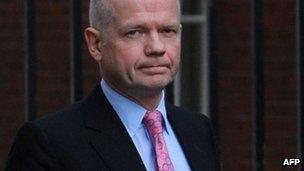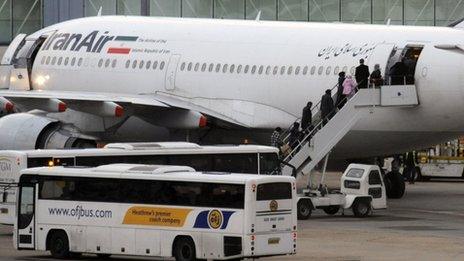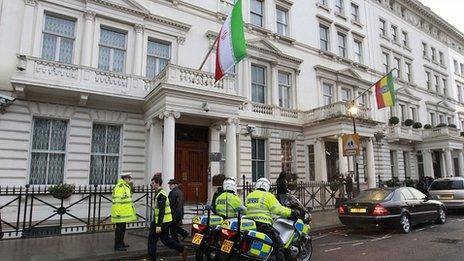Iran blocks UK Foreign Office website
- Published

William Hague said Britain would not be deterred from engaging with the Iranian people
The Iranian government has blocked access to the British embassy website for people in Iran, William Hague says.
The UK foreign secretary called on Iran's censors to reverse the "counter-productive and ill-judged" move.
He said it showed Tehran was determined to hide the "international community's legitimate concerns about Iran's policies and behaviour" from Iranians.
Mr Hague said Britain would continue to "engage with the Iranian people, including through the internet".
In a statement, external, Mr Hague said: "Britain's website in Iran has now been added to the list of thousands of other internet sites deliberately censored by the Iranian authorities."
He said the move would make it harder for Iranians to access information about visiting Britain and that it was "further proof to the rest of the world the Iranian government's dire record on freedom of speech and human rights in general".
'Anti-British rhetoric'
The Foreign Office website recommends against all but essential travel to Iran and against any travel to some parts of the country.
It states: "There has been a dramatic increase in anti-British rhetoric from parliamentarians and demonstrators. The Iranian parliament and Guardian Council voted on November 27 and 28 respectively to expel the British Ambassador to Iran.
"During a demonstration on November 29 the British Embassy in Tehran was attacked, entered and set on fire. British nationals have been arbitrarily detained in Iran in 2010 and 2011."
Mr Hague ordered the expulsion of 25 Iranian diplomats from Britain after the attack on its Tehran embassy. All UK diplomatic staff in Tehran were also evacuated and Britain's embassy closed.
Iran said it regretted the incident, which it described as "unacceptable behaviour by a small number of protesters".
However, Mr Hague said there had been "some degree of regime consent" and that the majority of those who took part were members of a regime-backed Basij militia group.
The attack came after Britain levied new sanctions on Iran, banning financial transactions with Iran's financial sector, including its central bank.
- Published3 December 2011

- Published30 November 2011

- Published30 November 2011

- Published26 October 2011
- Published14 October 2024
